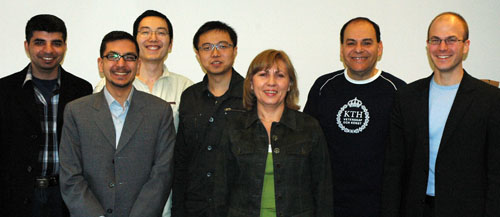Successful electronic students
It is rather unusual for undergraduate students to have their work published for a scientific conference. This honour is normally reserved for senior researchers. But it has been conferred on a group of four Masters students from China and Pakistan who participated in a project course run by the RaMSiS programme team.
The students and their tutors. From the left: Muhammad Ali, Saifullah Amir, Kang-Qiao Zhao. Xiaozhou Meng, senior lecturer Ana Rusu, professor Mohammed Ismail and postgraduate Martin Gustafsson.

The students with their tutors. From left: Muhammad Ali, Saifullah Amir, Kang-Qiao Zhao. Xiaozhou Meng, docent Ana Rusu, professor Mohammed Ismail and PHD student Martin Gustafsson.
This project began within the framework of the Design Project Courses I and II. The objective of the 15-credit course was for the student teams to learn more about project work in technical projects. The components of the programme were divided equally between project management and technology.
"My tutor Ana Rusu and I defined a small-scale research project that the students had to implement," explains postgraduate Martin Gustafsson. "They did this so successfully that we decided, together with the students, to write a scientific paper on their results."
After further simulations, modifications and tests, the students were ready to write a report about their research findings, which will now be presented at a major international conference, the ICECS conference, in August/September.
"The students have conducted research into how SAR A/D converters can be used to build reconfigurable electronics for WPAN devices," Martin explains. Their results show that there is a possible way of doing so.
Wireless Personal Area Network (WPAN) is a general term used to refer to wireless personal technology such as Bluetooth. The students' research findings form part of the work being conducted to increase the communication speed of WPAN equipment. This technology can be used for transferring a film from a PC to a mobile phone, or wireless printouts between PCs and printers.
Proud students
The students are all working on their Masters degree in System-on-chip Design. The attention they have received has left them feeling both proud and somewhat surprised. They are well aware that few students are granted the privilege of writing a scientific paper so early on in their career.
"This is a relatively unexplored field and very little has been published so far," explains Muhammad Ali from Pakistan. "So being given the chance to work on a brand new design was a real challenge."
All of the students are extremely pleased with the course and with what they have learned, especially while working as a team.
"This course has taught me how to work as part of a team and to write a scientific paper," says Kang-Qiao Zhao from China. "The project would not have ended so successfully without this teamwork."
Saifullah Amir tells us "The most exceptional aspect was that we really worked efficiently as a team, with everyone pulling their weight. That was the real reason we managed to achieve so much more than the original task demanded."
All four of them emphasise that they have learned an incredible amount during the course. None of them knew very much about project work or the technical aspect before the course began.
Xiaozhou Meng from China comments, "The challenge was our lack of experience of analogue mixed signal design. But thanks to our teachers, we were able to implement the project extremely well."
Further information about the conference
This year's ICECS Conference (IEEE International Conference on Electronics, Circuits and Systems) will be held in Malta and is expected to attract between 500 and 600 delegates.
